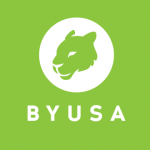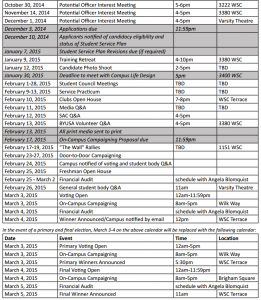
It’s election season at BYU, but with less than 30 percent of students voting, some question BYUSA elections and the process behind it all. Those running for office, however, want students to know BYUSA is improving, learning and constantly working for the betterment of BYU students.
All BYU students are considered members of BYUSA, but only 22 percent of BYU students voted in the 2013–2014 election. Matt Terry created a blog post in 2010 about the significance of these elections that still resonates with many.
“In recent memory (or in all of recorded history), does a specific BYUSA presidency stand out to you for some great act?” Terry wrote. “Of course not. They all do the same basic job and have the same basic values.”
The “basic” jobs and qualifications are more intense than it might at first seem. The elections handbook requires that candidates have two semesters of BYUSA leadership experience or one semester in BYUSA and one semester of leadership with a BYU organization. Those in leadership positions must maintain a minimum 3.0 GPA, and presidents and vice presidents must perform 25–30 hours of service weekly.
Terry said he doesn’t think it matters who is president and vice president because students will always benefit from quality activities and service opportunities. He said most candidates will likely represent the student body and the BYUSA organization in exactly the same way as is always done.

The elections this year, however, are different than any before – there will be no initiatives, or promised goods. Candidates explained that past presidents made promises they couldn’t keep, resulting in upset students. Many people based BYUSA’s success on its vending machine, WiFi or parking promises.
Instead, candidate groups will have service platforms and plans within their range of power. BYUSA does more than decorate for dances or plan parties. It continues to serve students and seeks to spread even more awareness of the organization.
According to the BYUSA website, the organization “acts as a student voice to the President’s Council.” BYUSA is also a service organization in which volunteers organize events like homecoming dances, Guitars Unplugged, The Unforum and Meet the Deans. BYUSA also works closely with BYU clubs.
BYUSA is run entirely by unpaid student volunteers, but the seven BYUSA vice presidents and those elected to the presidency receive scholarships. The subareas of BYUSA include involvement, clubs, student honor, student advisory council, activities, administration and communications.
Online voting began in 2012, enabling easier access for students. This year’s election opens March 3, and students can vote at vote.byu.edu. The six candidates will speak to the student body at a public student Q and A session Feb. 26 at the Wilkinson Student Center Varsity Theatre. All students are invited to attend.
The campaign schedule is rigorous and continuous, and the candidates want to be seen and heard in every capacity. Each group threw a rally event at The Wall, and some attend Clubs Night each Tuesday. The candidate groups this year have their own slogans and personalities, and, like Terry wrote, students can’t go wrong voting for any of the groups.




